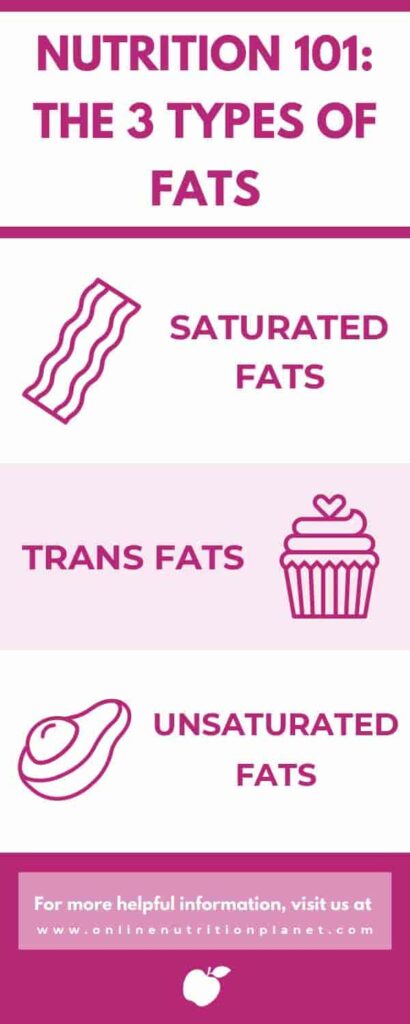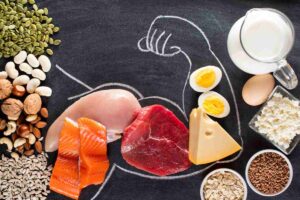Eating nutritious food is an essential part of keeping our bodies healthy. But one element of nutrition that’s often overlooked is fats. While too many fats can be bad, eating the right ones in appropriate amounts can be extremely beneficial to our health.
There are three main types of fats in foods. These are saturated fats, unsaturated fats, and trans fats. You need to consume a certain amount daily to get the health benefits they offer. However, trans fats are not suitable for you.
The following article is a detailed description of what fat is and the role it plays in the body. It also includes a description of the three main types of fats and how healthy or unhealthy they are.
Article Contents
What is Fat in Nutrition?
Fats are a certain type of nutrient that your body needs to perform all sorts of functions. They are sorted into multiple categories, including:
- Lipids
- Fatty acids
- Oils
- Vegetable fats
All of them are important to consume for your body to function properly.
The main function of each one when it comes to nutrition is providing energy, but that will be explained later in the article. The fats listed above also perform a plethora of other important functions. Lipids help the body transport fat-soluble nutrients throughout the body, ensuring you get enough nutrients throughout your body. Consuming a small number of fatty oils can also help your body absorb vitamins effectively.
Fatty acids are the main ingredient in creating cell membranes. Strong cell membranes ensure the cells are strong enough to prevent harmful bacteria and diseases from getting inside them. The stronger a cell is, the less likely you will get sick. Lastly, vegetable fats help regulate cholesterol in the body. Too much cholesterol can lead to cardiovascular issues, so eating vegetable fats can help you avoid that.
What is The Role of Fats in The Body?
The main roles of all fats in the body are:
- Providing a reservoir of energy
- Keeping our bodies warm
- Help you absorb important vitamins
Consuming enough fats will help your body perform all of these necessary functions.
The most important function that fats perform for our bodies is providing a reservoir of energy. Our body usually gets its energy from the carbohydrates it breaks down in our stomach. The acids in our stomach break down carbohydrates into glucose, which our body then uses for energy. But when our bodies run out of glucose, it turns to the fats we have stored up for energy.
Fats also act as an insulation component for our cells. The body must consume enough fats to keep its fat cells insulated. Fats have nine calories for every one gram consumed, which is more than two times the calories a gram of protein has. This means fats take up more space in our cells and provide more insulation than proteins. The more our fat cells are insulated, the warmer our bodies are.
Lastly, fats are in charge of helping your body absorb all the vitamins necessary to keep you healthy. The vitamins that fat helps you absorb include:
- Vitamin A
- Vitamin K
- Vitamin E
- Vitamin D
When vitamins are ingested on their own, they don’t usually get absorbed into the body fully since they’re micronutrients. Fats can help with this absorption since these vitamins are fat soluble. This means that they can be dissolved in fats easily, making it easier for the body to absorb them. The best way to ensure the body gets enough of the vitamins listed above is to consume an adequate amount of fatty foods containing those vitamins.
What Are the 3 Types of Fats?

- Saturated fats
- Trans fats
- Unsaturated fats
These are the three main types that can be digested, but not all of them are necessary for a healthy diet.
While these are the main types of fats necessary for your body to function, they should each be consumed in moderation. Too much of one fat can cause your body to dysfunction, but not enough can also result in your body having issues.
Saturated Fats
Saturated fats are also known as the “solid” fats in nutrition, since they have a solid structure at room temperature. They contain a high amount of hydrogen atoms, earning them the name “saturated” fats.
The primary purpose of saturated fats is to provide an energy reservoir for when your body runs out of carbohydrates to use. But consuming a large amount of them can lead to severe health issues. These issues include:
- A heightened level of low-density lipoprotein
- Cardiovascular diseases
- A high amount of cholesterol
- Stroke
Low-density lipoprotein (LDL) is a type of cholesterol in the body, sometimes referred to as the “bad” cholesterol. This is because too much of it can clog your arteries and make it harder for blood to get to your heart. This in turn, can lead to life threatening cardiovascular diseases, including stroke.
It’s recommended that you consume no more than 13 grams of saturated fats in one day. A few foods that contain the appropriate amount of saturated fats include:
- Diary products
- Vegetable oils
- Baked goods
- Cocoa butter
- Meat products
If you want to find healthier options for consuming saturated fats, then nuts and seeds are a great alternative.
Trans Fats
Trans fats, which are short for “transformed” fats, have been changed by hydrogenation. This makes them last longer and has a hard texture when at room temperature. They are often found in highly processed foods and foods high in sugar.
Trans fats are the most inessential fat on this list. They are fatty acids or oils that were changed in some way during the food’s cooking process. This chemical change gives them a significantly longer shelf life and makes food taste significantly better. Unfortunately, those two things are the only good attributes they have.
These fats play a significant role in causing bodily dysfunction and harm. A few things trans fats can contribute to are:
- Cardiovascular diseases
- Raised levels of LDL cholesterol
- Lowered levels of high-density lipoprotein cholesterol
Since LDL is the “bad” cholesterol, high-density lipoprotein is the “good” cholesterol. This type of cholesterol helps remove harmful forms of cholesterol from your blood, keeping it healthy. It can help lower your risk of getting heart disease and clogged arteries. A reduced amount of this can cause the cardiovascular system not to function properly, making trans fats extremely harmful.
The main foods that contain trans fats are:
- Fried foods, especially French fries
- Margarine and shortenings
- Processed and packaged foods
Eating a small amount of trans fats won’t cause you significant harm, but they should be avoided for the most part.
Unsaturated Fats
Unsaturated fats have a liquid form when they’re at room temperature. They are usually found in plant oils and are very helpful with keeping your cholesterol down. There are also two subgroups of unsaturated fats, called monounsaturated fats and polyunsaturated fats.
Unsaturated fats are also referred to as the “good” fats since they are primarily derived from plant oils and fish products. They can help lower your cholesterol levels and keep the risk of stroke and heart disease low. Unsaturated friends are split into two categories, which are monounsaturated fats and polyunsaturated fats.
Monounsaturated fats aren’t saturated with hydrogen atoms, and every fat molecule has bonded with one hydrogen atom each. This is what gives this fat its name since mono also means one or singular. As a result, monounsaturated fats are very good at lowering LDL cholesterol levels and maintaining adequate HDL cholesterol levels.
But in order to get the benefits of monounsaturated fats, you must also cut back on consuming saturated fats. This is because saturated fats cancel out the benefits of monounsaturated fats. So, you have to cut back on saturated fats, so you get all the benefits that monounsaturated fats have to offer. A few other foods that have monounsaturated fats in them include:
- Avocados
- Olives and olive oil
- Nuts and nut butter
Polyunsaturated fats are fat molecules that have multiple unsaturated carbon bonds attached to each molecule. This structure is what gives polyunsaturated fats their name since “poly” means multiple. These fats mainly come from fish and are good at keeping cholesterol levels and inflammation low.
Polyunsaturated fats also make a great replacement for saturated fats since they can reduce heart disease significantly while still being low in calories. A few foods that contain polyunsaturated fats are:
- Plant oils, such as sunflower oil
- Nuts and seeds
- Oily fish, such as salmon
Consuming these fats in moderation will help ensure that you stay healthy and that your body is functioning properly.
What is The Healthiest Fat to Eat?
The healthiest fats to eat are any unsaturated fats, including monounsaturated fats and polyunsaturated fats. These fats are the healthiest ones to eat because they are the most natural fats and lower in calories. They are found in plant oils and fish.
Since unsaturated fats are found naturally in plant oils, they are significantly lower in calories but still provide all of the health benefits unsaturated fats offer. However, it’s recommended that you only consume 16-22 grams of polyunsaturated fats per day. When it comes to monounsaturated fats, you can consume 33-44 grams per day.
What is The Worst Fat To Eat?
The worst fat to consume for your health is trans fats. It is a manufactured fat and not found anywhere in the natural world. It’s manufactured to be easy to use and to last a long time, making it high in processed chemicals and extremely harmful to your health.
It’s recommended that you stay away from trans fats as much as possible. Consuming even a small amount can set you on a path of heart complications. But if you do consume trans fats, then the limit is 2 grams per day. As long as you stay below that number, you won’t be as at risk for cardiovascular diseases and cholesterol issues.
Final Thoughts
Consuming the appropriate amount of fats in your daily diet is an essential part of keeping your body healthy and functioning properly. But it’s also important to make sure you don’t consume too much of any one fat, since that can also be counterproductive. Nutrition is all about consuming things in moderation, and that fact applies to consuming fats as much as consuming anything else.




